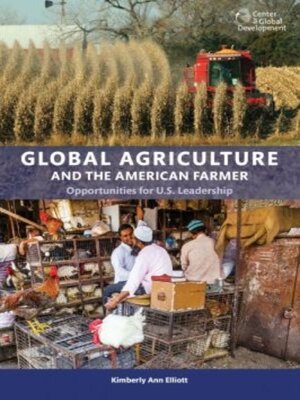Global Agriculture and the American Farmer
ebook ∣ Opportunities for U.S. Leadership
By Kimberly Ann Elliot

Sign up to save your library
With an OverDrive account, you can save your favorite libraries for at-a-glance information about availability. Find out more about OverDrive accounts.
Find this title in Libby, the library reading app by OverDrive.



Search for a digital library with this title
Title found at these libraries:
| Library Name | Distance |
|---|---|
| Loading... |
The United States is one of the world's largest producers and exporters of a range of agricultural commodities, and the largest provider of foreign assistance, so US policies have big effects on global food security and other global public goods linked to agriculture. But those effects are not always positive, as US support for farmers often comes in forms that distort global markets and ignore negative spillovers for the rest of the world.
In Global Agriculture and the American Farmer, Kimberly Elliott focuses on three policy areas that are particularly damaging for developing countries: traditional agricultural subsidy and trade policies that support the incomes of American farmers at the expense of farmers elsewhere; the biofuels mandate, which in its current form can contribute to market volatility while doing little if anything to mitigate climate change; and weak regulation of antibiotic use in livestock, which contributes to the global spread of drug-resistant super bugs. While noting that broad reforms are needed to fix these problems, Elliott also identifies practical steps that US policymakers could take in the relatively short run to improve farm policiesfor American taxpayers and consumers as well as for the poor and vulnerable in developing countries.
In Global Agriculture and the American Farmer, Kimberly Elliott focuses on three policy areas that are particularly damaging for developing countries: traditional agricultural subsidy and trade policies that support the incomes of American farmers at the expense of farmers elsewhere; the biofuels mandate, which in its current form can contribute to market volatility while doing little if anything to mitigate climate change; and weak regulation of antibiotic use in livestock, which contributes to the global spread of drug-resistant super bugs. While noting that broad reforms are needed to fix these problems, Elliott also identifies practical steps that US policymakers could take in the relatively short run to improve farm policiesfor American taxpayers and consumers as well as for the poor and vulnerable in developing countries.







